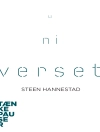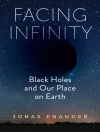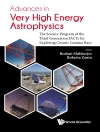Highlights the most recent developments in the Search for Extraterrestrial Intelligence (SETI), and advocates a diverse range of approaches to make SETI increasingly more powerful and effective in the years to come.
In April 2010, fifty years to the month after the first experiment in the Search for Extraterrestrial Intelligence (SETI), scholars from a range of disciplines-including astronomy, mathematics, anthropology, history, and cognitive science-gathered at NASA’s biennial Astrobiology Science Conference (Ab Sci Con) for a series of sessions on the search for intelligent life. This book highlights the most recent developments in SETI discussed at that conference, emphasizing the ways that SETI has grown since its inception. The volume covers three broad themes: First, leading researchers examine the latest developments in observational SETI programs, as well as innovative proposals for new search strategies and novel approaches to signal processing. Second, both proponents and opponents of ‘Active SETI’ debate whether humankind should be transmitting intentional signals to other possible civilizations, rather than only listening. Third, constructive proposals for interstellar messages are juxtaposed with critiques that ask whether any meaningful exchange is possible with an independently evolved civilization, given the constraints of contact at interstellar distances, where a round-trip exchange could take centuries or millennia.
As we reflect on a half-century of SETI research, we are reminded of the expansion of search programs made possible by technological and conceptual advances. In this spirit of ongoing exploration, the contributors to this book advocate a diverse range of approaches to make SETI increasingly more powerful and effective, as we embark on the next half-century of searching for intelligence beyond Earth.
表中的内容
Preface
Foreword
Linda Billings, Pamela Conrad, Janet Siefert
Acknowledgments
PART I. Latest Advances in the Search for Extraterrestrial Intelligence (SETI)
1. Exoplanets, Extremophiles, and the Search for Extraterrestrial Intelligence
Jill C. Tarter
2. Current and Nascent SETI Instruments in the Radio and Optical
Andrew Siemion, Henry Chen, Jeff Cobb, Jim Cordes, Terry Filiba, Adam Fries, Andrew Howard, Josh von Korff, Eric Korpela, Matt Lebofsky, William Mallard, Peter Mc Mahon, Aaron Parsons, Laura Spitler, Mark Wagner, Dan Werthimer
3. Candidate Identification and Interference Removal in SETI@home
Eric J. Korpela, Jeff Cobb, Matt Lebofsky, Andrew Siemion, Joshua Von Korff, Robert C. Bankay, Dan Werthimer, David Anderson
4. A New Class of SETI Beacons That Contain Information
Gerald R. Harp, Robert F. Ackermann, Samantha K. Blair, Jack Arbunich, Peter R. Backus, Jill C. Tarter, and the ATA Team
5. Getting the World Actively Involved in SETI Searches
Jill C. Tarter, Avinash Agrawal, Rob Ackermann, Samantha K. Blair, M. Tucker Bradford, Danese M. Cooper, Gerald Harp, Jane Jordan, Tom Kilsdonk, Kenneth E. Smolek, Karen Randall, Rob Reid, John Ross, G. Seth Shostak, Douglas A. Vakoch
6. The Effects of the Ionized Interstellar Medium on Broadband Signals of Extraterrestrial Origin
Samantha K. Blair, David G. Messerschmitt, Jill C. Tarter, Gerald R. Harp
7. The Next Steps in SETI-ITALIA Science and Technology
Stelio Montebugnoli, Cristiano Cosmovici, Jader Monari, Salvatore Pluchino, Giovanni Naldi, Marco Bartolini, Andrea Orlati, Emma Salerno, Francesco Schillirò, Giuseppe Pupillo, Federico Perini, Germano Bianchi, Mattia Tani, Leonardo Amico
8. Project SAZANKA: Multisite and Multifrequency Simultaneous SETI Observations in Japan
Shin-ya Narusawa, Mitsumi Fujishita, Hiroki Akisawa, Kenta Fujisawa, Yasuhide Fujita, Takahiro Fukuzumi, Hiromi Funakoshi, Hiroyuki Geshiro, Hideo Hara, Kenji Hashimoto, Tsutomu Hayamizu, Ryo Iizuka, Kazumasa Imai, Takeshi Inoue, Masayuki Kagami, Kazuhisa Kageyama, Takeshi Kamitamari, Masahiro Koishikawa, Shouta Maeno, Hidehiko Matsuo, Takashi Miyamoto, Masaki Morimoto, Hiroyuki Naito, Sumio Nakane, Takeshi Nakashima, Masami Okyudo, Takaaki Oribe, Takaaki Ozeki, Makoto Sakamoto, Yasuo Sano, Naoko Sato, Masayuki Tachikawa, Yoshimasa Tai, Setsuro Takahara, Yoshitaka Takahashi, Mikimasa Takeuchi, Naoto Tatsumi, Akihiko Tomita, Shinji Toyomasu, Naoki Toyoshima, Makoto Watanabe, Takeshi Yada, Ryoji Yamada, Michinari Yamamoto, Hideyo Yokotsuka
9. Harvard’s Advanced All-sky Optical SETI
Curtis Mead and Paul Horowitz
10. The OZ OSETI Project
Ragbir Bhathal
11. The New Telescope/Photometer Optical SETI Project of SETI Institute and the Lick Observatory
Frank D. Drake, Remington P. S. Stone, Dan Werthimer, Shelley A. Wright
12. Large-Scale Use of Solar Power May Be Visible across Interstellar Distances
Louis K. Scheffer
13. Interstellar Radio Links Enabled by Gravitational Lenses of the Sun and Stars
Claudio Maccone
14. Cost Analysis of Space Exploration for an Extraterrestrial Civilization
Yvan Dutil and Stéphane Dumas
15. Understanding the Search Space for SETI
William Edmondson
PART II. Active SETI: Should We Transmit?
16. Unpacking the Great Transmission Debate
Kathryn Denning
17. Integrating Active and Passive SETI Programs: Prerequisites for Multigenerational Research
Douglas A. Vakoch
18. Building and Searching for Cost-Optimized Interstellar Beacons
James Benford, Dominic Benford, Gregory Benford
19. Seeking Contact: The Relevance of Human History
Michael A. G. Michaud
20. Pragmatism, Cosmocentrism, and Proportional Consultation for Communication with Extraterrestrial Intelligence
Mark L. Lupisella
21. SETI and International Radio Law
Francis Lyall
22. What the World Needs Now: Identifying the Relative Degree of Specific Maslovian Needs and Degree of Species-Level Self-Identification in Interstellar Messages Submitted by a Multinational Sample
Timothy A. Lower, Douglas A. Vakoch, Yvonne Clearwater, Britton A. Niles, John E. Scanlin
PART III. Interstellar Message Construction: Can We Make Ourselves Understood?
23. Limits on Interstellar Messages
Seth Shostak
24. Communication among Interstellar Intelligent Species: A Search for Universal Cognitive Maps
Guillermo A. Lemarchand and Jon Lomberg
25. The Chemiosmosis Message—A Simple and Information- Rich Communication in the Search for Extraterrestrial Intelligence
Charles S. Cockell
26. A Proposal for an Interstellar Rosetta Stone
Stéphane Dumas
27. Processes in Lingua Cosmica
Alexander Ollongren and Douglas A. Vakoch
28. Testing SETI Message Designs
Michael W. Busch and Rachel M. Reddick
29. The DISC Quotient: A Post-Detection Strategy
John R. Elliott and Stephen Baxter
30. On the Universality of Human Mathematics
Carl L. De Vito
31. Cognitive Foundations of Interstellar Communication
David Dunér
32. Culture, Meaning, and Interstellar Message Construction
John W. Traphagan
Index
关于作者
Douglas A. Vakoch is Director of Interstellar Message Composition at the SETI Institute and Associate Professor of Clinical Psychology at the California Institute of Integral Studies.












